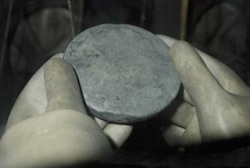Getting Serious about Locking Down Fissile Materials
March 12, 2010
Featured Image
We are happy to serve you a daily summary of the day's top nuclear policy stories each morning, with excerpts from the stories in bullet form.
Stories we're following today:
Facing the Nuclear Terrorism Threat - Alexandra Toma and Kenneth Luongo in The Hill [link]
- With enough nuclear material to build more than 120,000 Hiroshima-sized nuclear bombs spread around the globe, and significant amounts of these materials inadequately secured in dangerous regions, the nuclear terrorism threat is real and it’s time to get serious about rapidly locking down and reducing these dangerous stockpiles.
- This year the Obama administration and the Congress will have four unique opportunities to strengthen America’s defense against nuclear terrorism and expand the global coalition that can support the president’s goal of securing all vulnerable nuclear materials around the globe in four years.
- Effective and lasting nuclear security worldwide will not be achieved unless key policymakers around the world come to believe nuclear terrorism is a real threat to their countries’ security and economy, and then invest their time and resources to adequately address this threat.
Clinton, Medvedev to Meet in Moscow - Foreign Policy [link]
- Secretary of State Hillary Clinton will meet with Russian President Dmitry Medvedev next week in Moscow, a State Department official confirms to The Cable.
- The meeting will cover ongoing negotiations to finalize the follow-on to the START nuclear reductions treaty as well as other issues of mutual interest.
Biden Reassures Israel on Iran, Presses for Talks with Palestinians - Washington Post [link]
- Vice President Biden on Thursday assured Israelis that the United States is "determined" to prevent Iran from acquiring a nuclear weapon and urged Arab states, equally worried about Iran's nuclear program, to take steps toward peace with Israel.
- Biden drew a link between the effort to thwart Iran's nuclear ambitions and that of trying to push forward peace negotiations between Israel and the Palestinians.
- "They are connected indirectly, but there is a relationship," Biden said in a speech at Tel Aviv University.
The Proliferation Business: Unstoppable? Review of David Albright's Peddling Peril: How the Secret Nuclear Trade Arms America's Enemies - The Economist [link]
- Ever since the atom was split, governments have struggled to control a force with potential for good that can also wreak awful destruction.
- But the book’s real value is in pulling two clear threads from the facts and speculation. One is that commerce almost always trumps proliferation concerns, and not just among Mr Khan’s band of merry smugglers. Profits can be huge and catching traffickers hard.
- The other thread is China. Despite a raft of laws and sporadic enforcement, its ports and companies are still key links in the illicit export/import chains of North Korea, Iran and others. What is more, in the early 1980s China gave Pakistan a pre-tested design of a missile-mountable warhead.
- This single wanton act probably did the most to undermine the global non-proliferation regime.
Yes He Can: Obama's First Steps Toward Zero - Elise Connor for the Stimson Center [link]
- Since his inauguration, President Barack Obama has reinvigorated the international quest for disarmament and nonproliferation, bringing the nuclear debate to the forefront of his foreign policy agenda.
- The President’s oratory in this area has been inspiring, but he must avoid criticism of empty rhetoric and use the upcoming political and diplomatic opportunities to make meaningful progress in the next six months.
- Obama can begin by successfully concluding a follow-on to the Strategic Arms Reduction Treaty (START), which will signify a renewed commitment to nuclear restraint by the two countries whose nuclear arsenals make up 96% of worldwide stockpiles.



